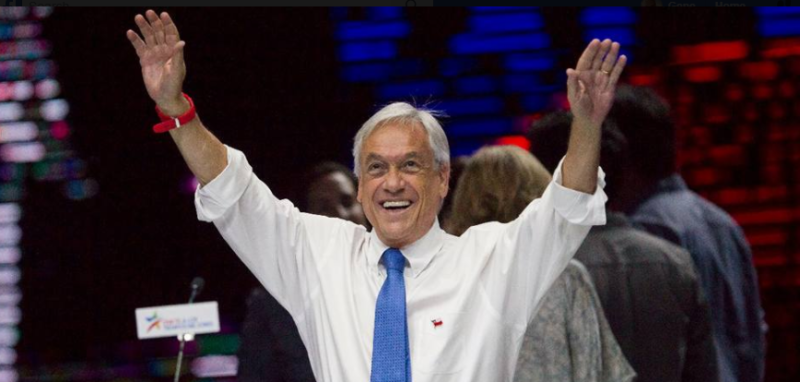Latin America Advisor
A Daily Publication of The Dialogue
What Can Chileans Expect From Piñera’s Return?
 Sebastián Piñera, who was Chile’s president from 2010 to 2014, is to return to the presidency in March after wining the country’s runoff election on Sunday.
Sebastián Piñera, who was Chile’s president from 2010 to 2014, is to return to the presidency in March after wining the country’s runoff election on Sunday.
Former Chilean President Sebastián Piñera on Sunday defeated his opponent Alejandro Guillier in the country’s presidential runoff election. To what can Piñera attribute his victory? How well will he be able to work with the country’s Congress in order to advance his agenda? What policy proposals can Chileans expect of Piñera, and what will be the main differences from the outgoing administration of President Michelle Bachelet?
Peter M. Siavelis, professor and chair of the Politics and International Affairs Department at Wake Forest University: "Much has been made of the victory of conservative Sebastián Piñera as part of a wider regional rightward trend in countries like Argentina, Brazil and Paraguay. This is a misinterpretation of Chile’s political moment. Center-left candidates garnered 42 percent in the November first-round presidential vote, and Piñera lacks a majority in Congress. Rather than a shift to the right, Chile is more significantly bucking a wider worldwide trend of electing protest candidates. Though he tacked to the right for the second round to pick up the votes of far-right candidate José Antonio Kast, Piñera is a moderate, and Chileans have opted for moderation and gradual reform over protest and populism. This is a surprising result, given how deeply the country is divided and how animated protests against the privatized health, education and social security systems have been. This presents a scenario of likely gradual reform and more of the same. Piñera lacks congressional support for a transformational legislative agenda, and he understands that this is not what Chileans want. What is more significant about this election is the complete transformation of the competitive dynamic of coalitions, given the adoption of a new, more permissive proportional legislative electoral system. Chile is likely returning to the pre-authoritarian pattern of competition between three coalitions of the center, left and right, signaling the reappearance of the pre-authoritarian conundrum of having to craft coalitions in Congress to govern. It is unlikely that Piñera will be able to do this, and Chile will likely be little transformed at the end of these four years, leaving many Chileans equally dissatisfied as they are today."
Guillermo Holzmann, professor at the University of Valparaíso in Chile and CEO of Analytyka Consulting: "The campaigns for the second round emphasized polarization as a strategy for increasing participation and establishing differences between the candidates. Without a doubt, this goal was achieved. The abstention rate fell, and the candidates adapted their strategies to consolidate electoral support on the left and right. While Guillier was seen as a continuance of Bachelet’s policies, Piñera emphasized a ‘social right’ that is more sensitive to citizens’ rights, assuring that social rights would not be affected during his presidency. This reduced doubts surrounding Piñera and satisfied the demands of voters who seek results and reasonable certainties with respect to their future well-being. In the end, the percentage of voters were pragmatic, and non-ideological, in casting their ballots. Piñera should exercise political management that allows him to establish a platform for dialogue and negotiation with a marked opposition in two sectors: one that declares itself as a constructive opposition, and the other, which is expressing a desire to confront Piñera’s governing style. The political experience of his government will be the first sign of what route he will follow. The second will be expressed in his design to negotiate the central aims of his government, which include modifications to Bachelet’s reforms, the maintenance of acquired social rights and obtaining financing for everything associated with the country’s economic growth. It will entail different and simultaneous management styles, which will be Piñera’s challenge in his first 100 days in office."
Peter DeShazo, visiting professor of Latin American, Latino and Caribbean Studies at Dartmouth College and former deputy assistant secretary of state for Western Hemisphere affairs: “In an earlier Q&A, I expressed the opinion that Piñera had the advantage in the second round and that Guillier would be hard-pressed to attract enough votes on the left to make up the difference. That appears to have been the case. While Piñera won additional votes in the political center and among independents, Guillier failed to get enough traction with youthful protest voters who supported the leftist Broad Front in the first round. Piñera’s wide margin of victory, however, owed less to ideological preference than to his greater appeal among voters on job creation, economic growth, and crime and to dissatisfaction with the status quo. He won in every region except the far south and scored surprisingly well in working class neighborhoods of Santiago. To see the result as a ringing endorsement of the right and a rejection of the left would be a mistake. With a divided Congress, Piñera must attract support from the center-left to advance legislation while facing potentially divisive factionalism between right and center-right elements in his own coalition. Uncharacteristically, more Chileans voted in the second round than the first, and expectations for change are running high. The challenge for Piñera is to build public support and political consensus around social and economic policies that promote sustained development but also address the concerns of less advantaged Chileans. This will require a policy vision that transcends traditional thinking on the Chilean right."
The Latin America Advisor features Q&A from leaders in politics, economics, and finance every business day. It is available to members of the Dialogue's Corporate Program and others by subscription.



















